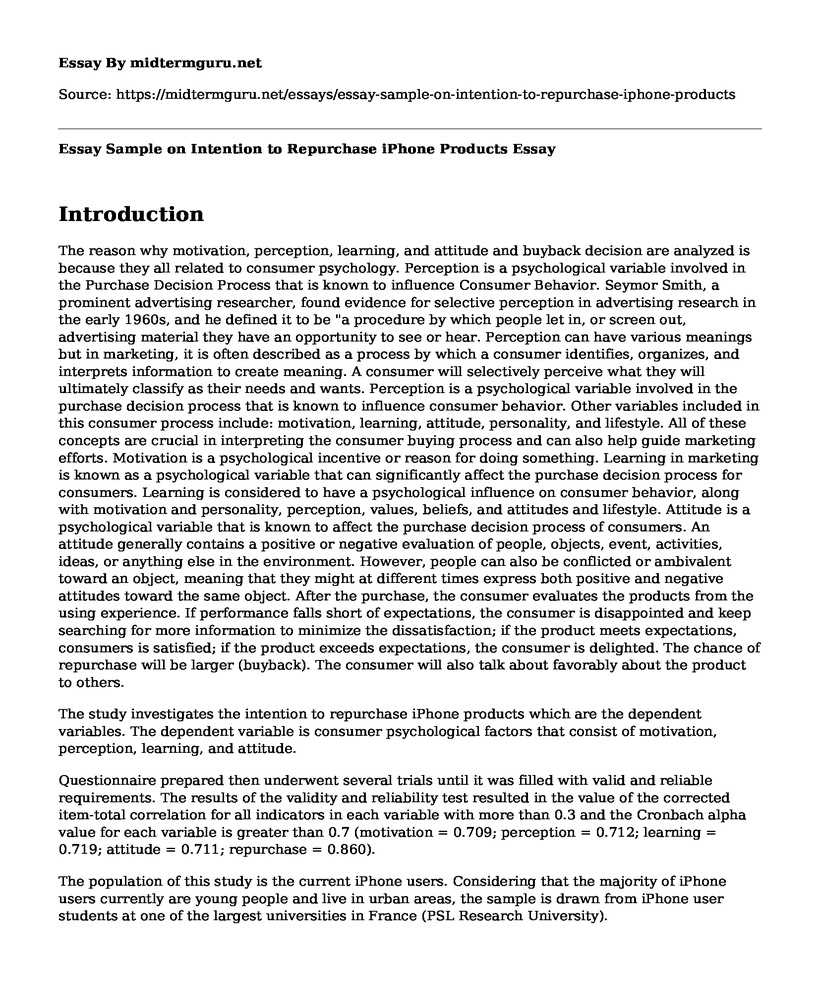Introduction
The reason why motivation, perception, learning, and attitude and buyback decision are analyzed is because they all related to consumer psychology. Perception is a psychological variable involved in the Purchase Decision Process that is known to influence Consumer Behavior. Seymor Smith, a prominent advertising researcher, found evidence for selective perception in advertising research in the early 1960s, and he defined it to be "a procedure by which people let in, or screen out, advertising material they have an opportunity to see or hear. Perception can have various meanings but in marketing, it is often described as a process by which a consumer identifies, organizes, and interprets information to create meaning. A consumer will selectively perceive what they will ultimately classify as their needs and wants. Perception is a psychological variable involved in the purchase decision process that is known to influence consumer behavior. Other variables included in this consumer process include: motivation, learning, attitude, personality, and lifestyle. All of these concepts are crucial in interpreting the consumer buying process and can also help guide marketing efforts. Motivation is a psychological incentive or reason for doing something. Learning in marketing is known as a psychological variable that can significantly affect the purchase decision process for consumers. Learning is considered to have a psychological influence on consumer behavior, along with motivation and personality, perception, values, beliefs, and attitudes and lifestyle. Attitude is a psychological variable that is known to affect the purchase decision process of consumers. An attitude generally contains a positive or negative evaluation of people, objects, event, activities, ideas, or anything else in the environment. However, people can also be conflicted or ambivalent toward an object, meaning that they might at different times express both positive and negative attitudes toward the same object. After the purchase, the consumer evaluates the products from the using experience. If performance falls short of expectations, the consumer is disappointed and keep searching for more information to minimize the dissatisfaction; if the product meets expectations, consumers is satisfied; if the product exceeds expectations, the consumer is delighted. The chance of repurchase will be larger (buyback). The consumer will also talk about favorably about the product to others.
The study investigates the intention to repurchase iPhone products which are the dependent variables. The dependent variable is consumer psychological factors that consist of motivation, perception, learning, and attitude.
Questionnaire prepared then underwent several trials until it was filled with valid and reliable requirements. The results of the validity and reliability test resulted in the value of the corrected item-total correlation for all indicators in each variable with more than 0.3 and the Cronbach alpha value for each variable is greater than 0.7 (motivation = 0.709; perception = 0.712; learning = 0.719; attitude = 0.711; repurchase = 0.860).
The population of this study is the current iPhone users. Considering that the majority of iPhone users currently are young people and live in urban areas, the sample is drawn from iPhone user students at one of the largest universities in France (PSL Research University).
The results showed that from the four factors of consumer psychology which are independent variables, only attitudes significantly affect repurchase decisions, with a t value of 4.816. This means that a positive attitude towards iPhone products will increase the tendency to repurchase iPhone products. This result is in accordance with the initial predictions outlined in the hypotheses of research (H4). The more positive the user's attitude towards iPhone products, the higher the possibility to repurchase iPhone products. In contrast, the more negative the attitude of iPhone users to iPhone products, the more likely it is to repurchase iPhone products. These results have implications for the need for iPhone marketers to maintain and improve consumers' positive attitudes towards iPhone products. The results of the study also show that it turns out that motivation, perception, and learning do not have a significant effect on the decision to repurchase iPhone products. This means that in this case, the high and low of these three variables do not have an impact on the high and low likelihood of consumers to buy back iPhone products. The implication is that if marketers have limited resources, then in the context of this research it is better if these resources are only directed and allocated to change consumer attitudes in a more positive direction.
Cite this page
Essay Sample on Intention to Repurchase iPhone Products. (2022, Dec 21). Retrieved from https://midtermguru.com/essays/essay-sample-on-intention-to-repurchase-iphone-products
If you are the original author of this essay and no longer wish to have it published on the midtermguru.com website, please click below to request its removal:
- Childrens Eating Behavior - Paper Example
- Research Proposal on Mental Illness
- Articles Analysis Essay on Animal Behavior
- Role of Neuroimaging Techniques in Psychiatry? - Essay Sample
- Research Paper on Training for Clinical Supervisors
- Plato: Advocating Morality, Righteousness, and Justice - Essay Sample
- Paper Example on Culture-Bound Syndromes: Bipolar Disorder







